Kathmandu, May 13: A powerful earthquake jolted mountainous Nepal on Tuesday, killing at least 66 people, including 17 in India and one in Chinese Tibet, bringing down buildings and triggering landslide less than three weeks after a devastating temblor left a swathe of destruction in the Himalayan nation.

Hundreds of terrified people rushed out of their homes and buildings toppled as the 7.3-magnitude earthquake, centred 68km west of the town of Namche Bazaar near Mount Everest, sent ripples in India all the way from the border states of Bihar and West Bengal to Gujarat and Delhi.
In Nepal the death toll reached 48, with 1,176 injured, police spokesperson Kamal Singh Bam said.
Seventeen people were killed in Bihar and Uttar Pradesh, the home ministry said in a statement, and Chinese media reported one person died in Tibet after rocks fell on a car.
"I was taking my afternoon nap after lunch and somehow managed to rush out with my baby. My house is safe but I am afraid to go inside," said Bimala Magar, a resident of Kathmandu's Dhumbarahi.
More than 1,000 people were injured as the quake flattened buildings in Kathmandu and other parts of Nepal already weakened by the 7.9-magnitude April 25 earthquake.
The fresh tremors, which lasted nearly a minute, came just as residents of Kathmandu and other districts were picking up the pieces after last month's quake that killed about 8,000 people and uprooted millions.
Rescue helicopters were sent to districts northeast of Kathmandu, where landslides and buildings, collapsed by Tuesday's quake, may have left people buried, the government said. Home ministry spokesperson Laxmi Dhakal named Sindhupalchok and Dolkha districts as the hardest hit.
Many people were still seen grouped together on roads and open spaces more than three hours after the quake which was followed by at least eight powerful aftershocks.

Parents were seen clutching children tightly and hundreds frantically tried to call relatives on their mobile phones. Shopkeepers closed their shops and the streets were jammed with people rushing to check on their families.
Nepal Police sent out tweets asking residents to clear the roads for movement of rescue workers while police also asked people not to clog the mobile network with calls and use text messages for sending information.
Operations at Kathmandu's Tribuvan International Airport were suspended and Nepal's parliament, which was in session when the quake struck, was also adjourned.
"Search and rescue teams have been sent to all affected districts. These are difficult times for Nepal, I appeal for all friends to help us and urge our citizens to stay strong," Prime Minister Sushil Koirala said.
Mountaineers seeking to scale the world's tallest peak have called off this year's Everest season after 18 people died when last month's quake triggered avalanches.
Dambar Parajuli, president of Expedition Operators' Association of Nepal, said there were no climbers or sherpa guides at the Base Camp when the quake struck on Tuesday. "All of them have already left," Parajuli said.
In Lukla, the departure point for treks to Everest, buildings cracked and small landslides were triggered when the ground shook.
"We saw the mountain in front of us fall down ... earth and rocks,” said Susana Perez from Madrid, who was on a 10-day trek with her husband to Island Peak in the Everest region and was about to reach Lukla. “There were some houses underneath but it was not clear if they were hit."
Earthquake: 42 killed in Nepal, 17 in India
Kathmandu, May 12: A new 7.3-magnitude earthquake and several powerful aftershocks shook Nepal today killing at least 42 people and triggering panic in the Himalayan nation already devastated by a massive temblor less than three weeks back that had claimed over 8,000 lives.
Nepal's Home Ministry while putting the death toll at 42 said another 1,117 people had been injured in the latest quake that hit hardest in remote mountain districts northeast of the country's capital Kathmandu.
The earthquake struck at 12:35 PM, some 83 km east of Kathmandu near Mount Everest at a shallow depth of 15 km, the US Geological Survey(USGS) said.
The agency had earlier measured the quake at 7.4 on the Richter Scale but later revised the intensity to 7.3.
The quake hit Dolakha and Sindhupalchowk districts - the worst-affected areas in the last month's temblor. At least 19 people were killed in Dolakha, police said.
A second tremor of 6.3-magnitude struck about 30 minutes after the 7.3-magnitude quake that sent terrifed residents running into the streets of the traumatised capital.
The USGS said there were five more aftershocks measuring over 5 on the Richter Scale after the second tremor that kept people on the edge.
Police said half-a-dozen buildings were destroyed in Kathmandu.
The fresh quake triggered massive panic among the people, who have been staying in the open since the 7.9-magnitude temblor struck on April 25, killing over 8,000 people and flattening thousands of buildings besides destroying whole villages.
"All available helicopters along with Medical Team; SSR Team going to be mobilised to Dolakha and Sindhupalchowk soon," said Nepal's National Emergency Operation Centre.
The Indian Air Force (IAF) has stationed eight helicopters in Nepal and one of them conducted an aerial survey soon after today's quake.
Nepal's only international airport, the Tribhuvan International Airport, was briefly closed by authorities and flights to Kathmandu were diverted.
Authorities have also ordered all schools to be closed for the next two weeks.
Strong tremors were felt in Kathmandu where people ran out of their houses in panic and some even started crying. Authorities appealed to people to stay in open field.
The temblor triggered landslides and toppled buildings in Nepal that recently witnessed its worst quake in over 80 years and over 160 aftershocks.
At the main hospital in Kathmandu, patients hurt in last month's quake were brought out in wheelchairs to avoid further injury.
Today's quake had its impact in several cities in Bihar, West Bengal and UP and tremors were felt across vast stretches of east and northeast India, where the death toll has reached 17 so far.
The tremors were also felt in China, where one woman was killed in Tibet.
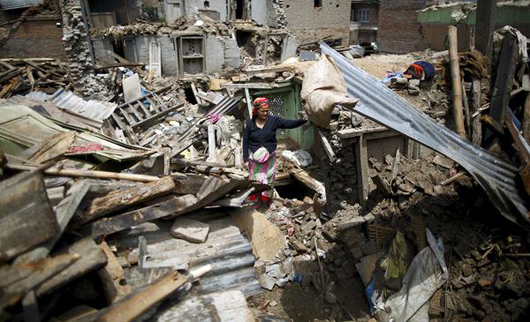
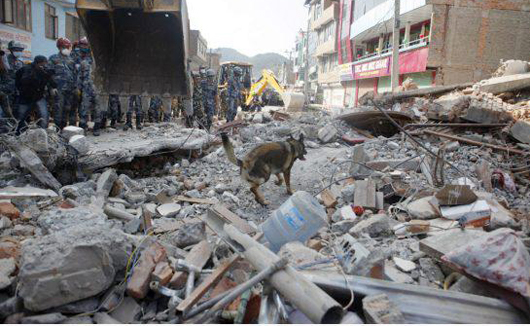
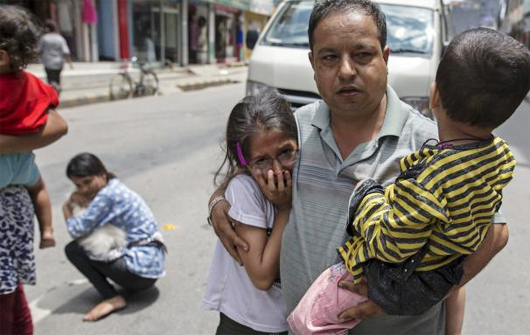
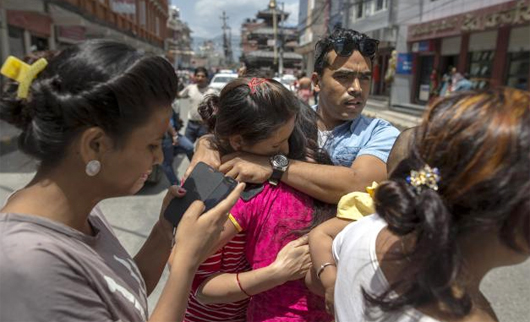
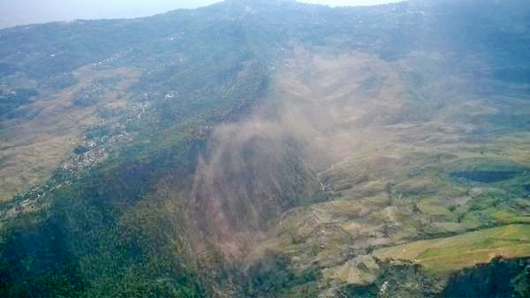
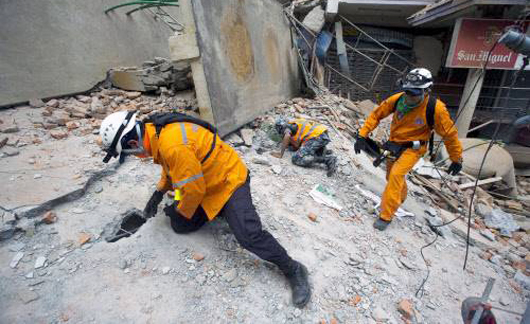
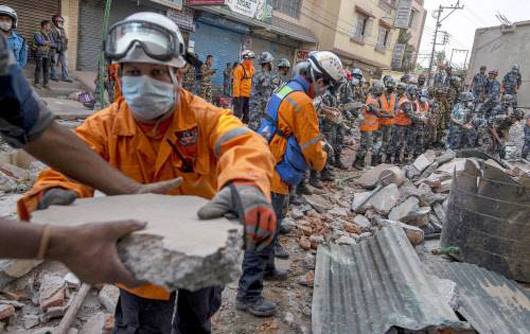
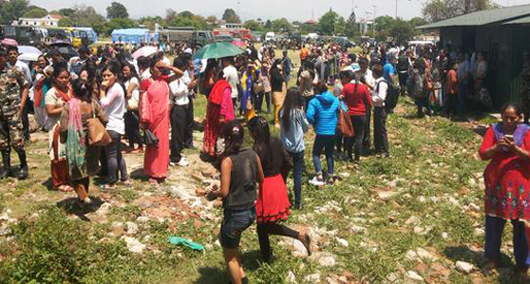

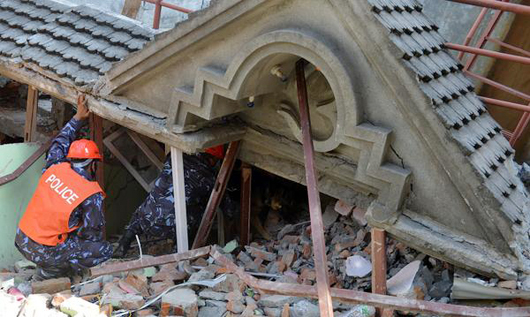




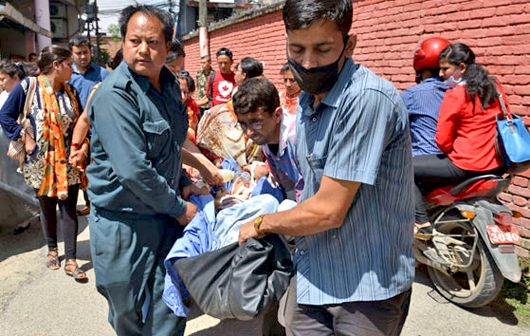

Comments
Add new comment